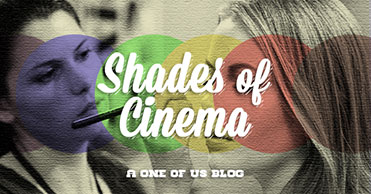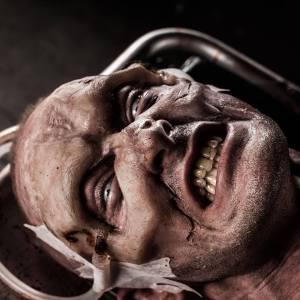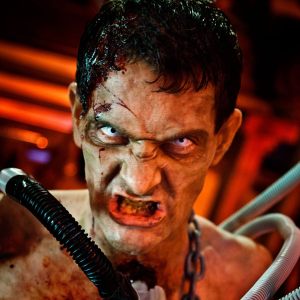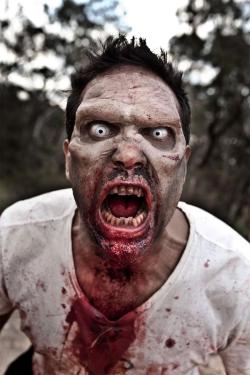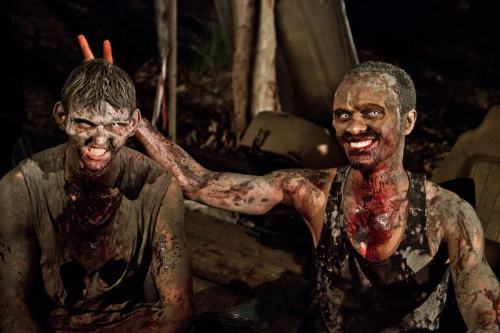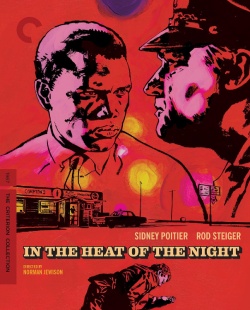For this week’s blog on Shades of Cinema, I am bowing my brushes to the fabulous and absolutely gorgeous Lisa Cotterill, an accomplished make-up artist and make up instructor from Down Under!
Years doing make-up: 20 years
Favorite Make Up Color: Lividity by Premiere Products Inc. It’s the color of decomposition for corpses.
Favorite Brush: My flicking brush. It literally costs $2 and it’s my favorite. In the United States, they’re called “chip brushes.”
What made you choose make up as a career?
That’s an interesting question. When I was in high school I wanted to get into psychology , but at the time my grades weren’t quite good enough and I had already been doing make up for friends. I think it was my cousin who said, “Why don’t you take professional make up course and see where it takes you?” So I ended up doing the course and pretty much got into make up for ten years, took a break in forensic science, then came back to make up.
So you were in forensic science?
Yes, for about four years, but I continued to do make up during school and doing forensics.
What school did you go to for make up?
I went to Make Up Glamour Technicians in Bondi Junction, Sydney in 1995.
Are you strictly a film make-up artist?
Every now and again I’ll do a wedding, but most of my work is usually commercials and film. A majority of my special effects work is in film and in special events as well. I worked on a couple of my high profile clients recently who were going to celebrity Halloween parties and I do them as a private gig. I love the special effects and I teach special effects as well.
What do you prefer?
Definitely special effects over straight make up. Yeah, I’ve kind of been doing zombies now for the last four years so ask me to do a werewolf or aliens, anything other than a zombie for a little while! Take me away from the zombie genre for a little while!(giggle)
Your recent work with zombie make up is specifically referring to your work in Wyrmwood. How did you come to work with that particular project?
I was teaching in a school and “the boys,” Tristan and Kia Roach-Turner approached the school hoping that the students could work on the film. When I had a look at the script, I felt that it was a little more complicated than what we teach here. So, I thought, okay, I can always head up the department, teach them a couple of things, and then I would leave the project and the students can continue with the project. Unfortunately, the students found it to be too much work and ended up letting it drop by the wayside. I continued with it. I just thought it was lots of fun and allowed me to hone my skilled in special effects. We worked on the film for 4 years. It’s finally finished and will be getting some screen time soon.
How fast can you create a zombie?
I have been known to whip out a zombie in half an hour, but I like to get 1-1 ½ hours in for a zombie.
Do you ask your subjects to prep their skin before working on them?
I don’t have my subjects do any prep, especially if I’m doing zombies. The worse their skin looks the better for me. Obviously, it’s a little harder for me if I have these beautiful models, it’s a lot of work. The prep that I do is that I make sure the skin is toned and there’s no oil on the skin. Then I put down a product called Derma Shield to protect them from any harsh products I may be putting on the skin.
When you do special effects, do you make your own prosthetics?
Yes. I work from home and I have a spare room set up in my apartment. I have it all set up as a lab. I mold, sculpt, and color all of my prosthetics. I put myself to do that using books and Vimeo videos. I’ve taught myself.
How do you learn new techniques?
You never know where you’re going to learn something. I did start the Dick Smith Correspondence course a few years back. And I kind of puttered it out and never finishedit. But there is a lot of information to be learned from old school techniques.
Has the emergence of high definition changed your technique?
Oh, absolutely! It changes your products, it changes your application techniques, and it changes the way you view things as well. Back in the old days, when I was doing television in here Australia, you’d look in the mirror as you were working to see how it would look on film, because, it was a diffused image. It would be quite pixelated. Whereas these days, what you look at while you’re working is what the camera sees. There’s disparity between something that’s very unblended and something that’s slightly unblended.
What’s your most difficult day on the job?
I know the most challenging day on the job. We were shooting in an area of Sydney in the Blue Mountains on the property of a lovely couple who was helping us out. We had 25 fully “prostheticked” zombies. So contact lenses, facial prosthetics, lots of blood. I had a team of 10 make-up artists helping out on that day. It was like a production line. We were justgetting zombies made up, getting them sorted, chucking contact lenses, and covered in mud and blood. It was just a messy production line. We ended up with 35 zombies, 25 that were fully “prostheticked” and 10 that were just mostly cream, highlight/shade, contact lenses, and blood. That was a very big day, we started at 5AM.
What are your goals in your career?
I can only see my career going from strength to strength at this stage. I have considered coming to the United States and refining my techniques and learning from a couple of experts. This is the kind of industry where you can’t rest on your laurels. You have to keep updating and learning new techniques because there’s always something new happening. I’d love to do something like Hannibal or Walking Dead, and those kinds of TV series. That would be an ideal place for me. Even though it’s a quick turnover, I work quite well under pressure.
What advice would you give a new make-up artist in the industry?
Definitely get your skills honed, practice and paint as much as you possibly can. Look into assisting established make-up artists so that you can work with them and find out, not just the skills of make-up, but how to work behind the scenes. How to conduct yourself on set, who to talk to, when not to talk, learning the nuances of the industry. Especially in film and television, it’s one of those industries where people are expecting high quality work. It’s not what it used to be, there’s a lot more competition and you really need to make sure you’re at the top of your game.
At the end of the day, if you have an artistic temperament, you just need to get out there and express yourself. Try everything, read books, read blogs, watch videos. Just see what’s out there and you’ll find a place that you belong in. Make up is such a vast industry besides even film and television, there’s commercial, there’s fashion, and beauty make up. There so much out there. I think there’s a pocket for every make-up artist. You find where you fit in and what works for you.


